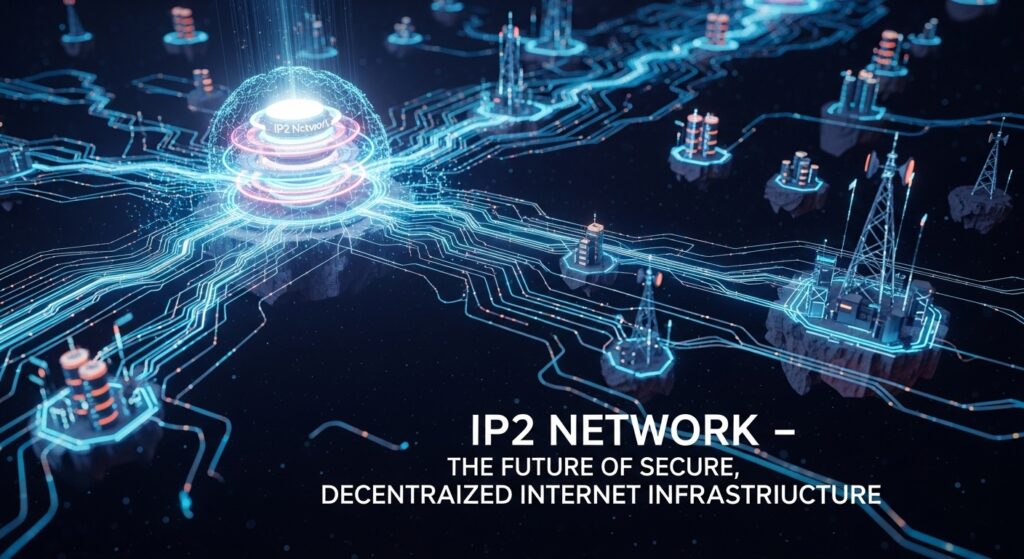In today’s rapidly evolving digital landscape, security, privacy, and efficiency are more important than ever. The IP2 Network emerges as an innovative solution that aims to redefine how data travels across the internet. Unlike traditional centralized systems, IP2 Network utilizes decentralized networking architecture and blockchain technology to create a faster, more secure, and transparent digital ecosystem.
The concept of IP2 Network is built around empowering users, businesses, and developers to connect and share data without the limitations and vulnerabilities of conventional systems. Whether it’s for secure communication, cloud computing, or data storage, IP2 Network stands at the forefront of the next internet revolution.
What is IP2 Network?
IP2 Network is a blockchain-based infrastructure that integrates advanced networking protocols to provide a decentralized internet experience. It is designed to replace traditional IP-based communication systems with a more transparent and efficient framework.
Unlike centralized networks controlled by internet service providers, IP2 Network distributes control among nodes — ensuring that no single entity can manipulate or monitor user data.
Core Concept
At its core, IP2 Network promotes the idea of an Internet 2.0, where users own their data and have complete control over their digital presence.
Key Features of IP2 Network
| Feature | Description |
|---|---|
| Decentralized Architecture | Eliminates single points of failure by distributing data across global nodes. |
| Blockchain Integration | Ensures transparency, immutability, and secure data transactions. |
| Enhanced Privacy | Users can interact anonymously without compromising personal data. |
| Scalability | The network can handle millions of simultaneous connections efficiently. |
| Smart Routing | Uses AI-driven algorithms to find the fastest and safest route for data transfer. |
| Cross-Platform Compatibility | Works seamlessly across different operating systems and devices. |
These advanced features make IP2 Network an essential technology for secure communication and digital innovation.
How IP2 Network Works
The IP2 Network combines decentralized nodes, smart contracts, and blockchain verification to create a transparent and efficient ecosystem.
-
Node-Based Infrastructure:
Each device that joins the IP2 Network becomes a node, helping transmit and verify data packets. -
Smart Contract Layer:
Smart contracts automate verification, resource sharing, and payment processes between nodes. -
Blockchain Verification:
All transactions and communications are recorded on a blockchain, ensuring traceability and preventing tampering. -
AI Routing System:
Artificial intelligence manages traffic flow, reduces congestion, and ensures optimal bandwidth utilization.
This combination results in a network that’s not just faster — but smarter, safer, and more user-centric.
Applications of IP2 Network
1. Secure Communication
IP2 Network provides end-to-end encryption for messages, video calls, and data transfers. This makes it ideal for businesses and individuals prioritizing privacy.
2. Decentralized Cloud Services
By distributing data storage across multiple nodes, IP2 Network prevents data breaches and system failures — offering a reliable alternative to traditional cloud providers.
3. Internet of Things (IoT)
IoT devices can communicate securely through the IP2 Network without relying on vulnerable central hubs, reducing cybersecurity risks.
4. Web3 and Blockchain Integration
IP2 Ntwork supports decentralized applications (dApps), NFT ecosystems, and blockchain interoperability, contributing to the Web3 revolution.
5. Enterprise Solutions
Organizations can use IP2 for secure file sharing, remote collaboration, and real-time analytics without exposure to data leaks.
Advantages of IP2 Network
| Advantage | Impact |
|---|---|
| High Security | Protects user data using blockchain-based encryption. |
| Low Latency | Optimized routing ensures faster data delivery. |
| User Ownership | Users retain control over their digital identity and assets. |
| Transparency | Every transaction and communication is verifiable on the blockchain. |
| Cost Efficiency | Peer-to-peer infrastructure reduces operational costs. |
These benefits make IP2 a practical choice for industries looking to enhance cybersecurity and efficiency.
Comparison: IP2 Network vs. Traditional Internet
| Aspect | Traditional Internet | IP2 Network |
|---|---|---|
| Control | Centralized under ISPs and corporations | Fully decentralized |
| Security | Vulnerable to hacks and data leaks | Blockchain-based encryption |
| Speed | Dependent on local servers | Global distributed network |
| Data Ownership | Controlled by service providers | Owned by individual users |
| Transparency | Limited accountability | Complete transparency via blockchain |
This comparison highlights how IP2 improves upon traditional infrastructure in every major area of concern.
The Technology Behind IP2 Network
The innovation of IP2 lies in its technological foundation. It integrates multiple emerging technologies to form a cohesive system:
-
Blockchain Technology ensures transparent and immutable data storage.
-
Peer-to-Peer Protocols eliminate central servers, enhancing resilience.
-
AI and Machine Learning optimize traffic routing and load balancing.
-
Quantum-Resistant Encryption prepares the network for future security threats.
-
Smart Contracts automate network governance, payments, and node operations.
This blend of technologies makes IP2 one of the most forward-looking projects in digital infrastructure.
IP2 Network and the Future of Web3
The Web3 movement is reshaping the internet into a decentralized, user-controlled ecosystem — and IP2 fits perfectly within this vision.
By offering a secure and scalable framework for decentralized applications, NFT markets, and smart contracts, IP2 helps developers create next-generation platforms that are independent of corporate oversight.
It enables seamless integration with existing blockchain systems, allowing cross-chain communication and interoperability. This flexibility ensures that IP2 Nework will remain relevant as Web3 continues to evolve.
Why Businesses are Adopting IP2 Network
Companies are increasingly integrating IP2 into their operations for several reasons:
-
Data Protection: Ensures regulatory compliance with data privacy laws like GDPR.
-
Cost Savings: Reduces dependency on expensive centralized cloud providers.
-
Innovation: Encourages the development of custom decentralized applications.
-
Trust Building: Customers value transparency and data security, which IP2 delivers.
By adopting IP2 Ntwork, businesses not only safeguard their operations but also future-proof their digital infrastructure.
Challenges and Future Developments
Like any emerging technology, IP2 faces challenges — including large-scale adoption, regulatory hurdles, and infrastructure integration.
However, the development team is actively working on solutions such as cross-chain scalability, improved user interfaces, and partnerships with global telecom providers.
In the coming years, IP2 plans to introduce AI-driven cybersecurity tools, token-based incentives for node operators, and integration with quantum computing protocols.
How to Join or Use IP2 Network
Getting started with IP2 is simple and accessible for both individuals and developers:
-
Visit the Official IP2 Website: Learn more about its roadmap, documentation, and use cases.
-
Download the Node Software: Join the network as a node operator and contribute resources.
-
Create an Account: Set up your profile for personal or business use.
-
Explore dApps and Tools: Start using decentralized services built on IP2.
-
Earn Rewards: Participate in governance and earn tokens for contributing to the ecosystem.
Conclusion
The IP2 Ntwork represents a monumental step toward a decentralized, secure, and efficient digital world. By merging blockchain technology with modern networking protocols, it offers users and organizations a safer and more transparent internet experience.
In an age where data privacy and trust are increasingly at risk, IP2 provides the tools and vision necessary to build a sustainable and user-controlled digital future.
As we move into the era of Web3, IP2 stands as a pillar of innovation — redefining how we connect, communicate, and collaborate online.






